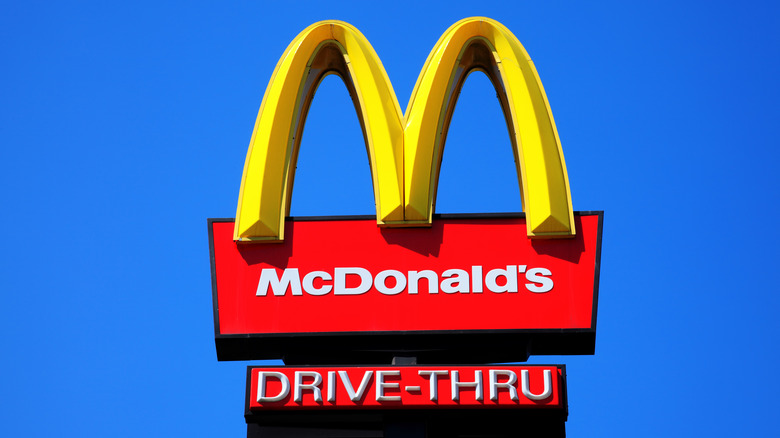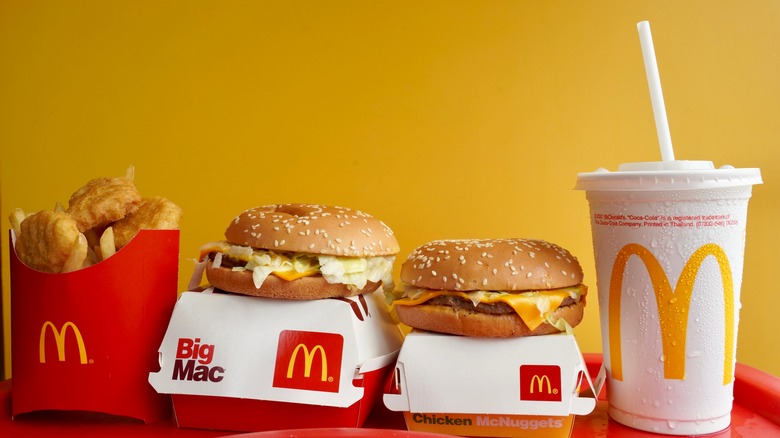You Probably Have The Infamous McDonald's Coffee Story All Wrong
If you grew up in the '90s, you definitely remember the infamous McDonald's coffee story. A woman (never named in the public recounting of the tale) spilled hot coffee on herself and then sued the Golden Arches for it. The story was held up as the apex example of American lawsuit culture gone horribly wrong; clearly, the woman in question was to blame for the problem, and it's a cautionary tale about how dumb our legal system is, right?
Wrong. It turns out that if you've spent the intervening years thinking the McDonald's coffee lawsuit was a tale of one woman's hubris and the legal system that unfairly gave her money for it, you've had the entire thing wrong. It turns out that not only did she deserve to win the lawsuit, but McDonald's was lucky to settle with her for as little as they did — and McDonald's has spent decades trying to make sure you don't realize it.
In 1992, 79-year-old Stella Liebeck of Albuquerque, New Mexico, ordered a black coffee from McDonald's after being driven there by her grandson, then spilled it on herself. These are the facts that both the popular recollection of the case and the actual truth agree on, but that's basically where they diverge.
McDonald's was legitimately serving an unsafe product
You might not have realized the woman in the story was a sweet old grandma, but you probably would've heard some recounting of the tale where she was driving and spilled the coffee on herself. Actually, though, she was sitting in a parked car. And Liebeck acknowledged that the spill itself was her fault — that's not what the lawsuit was about. The lawsuit was about McDonald's serving their coffee at an absurdly hot temperature, roughly 190 degrees Fahrenheit. As a reminder, water boils at 212 degrees Fahrenheit. This is what is known as "dangerous."
The end result was that Liebeck suffered severe third-degree burns to her legs and genitals from the coffee; it quite literally almost killed her and required a lot of surgery to deal with. McDonald's knew serving coffee this hot was a danger because they'd gotten 700 reports of people burning themselves on it in the prior decade. Still, they kept insisting this is how customers wanted their coffee served, despite it quite literally being unsafe for human consumption. Liebeck didn't want millions from McDonald's; she just wanted them to pay the $20,000 for her medical bills. The company then countered (six months later) with ... $800. This would prove to be a mistake after Liebeck was pretty much given no choice but to sue as a result.
McDonald's has been lying to us about this case for decades
Despite McDonald's being possessed of a team of high-priced, carnivorous lawyers, the jury wasn't swayed by the corporate behemoth. Though Liebeck was still only asking for $20,000, even after the hassle McDonald's had put her through, the jury awarded her $2.9 million. So, did she really get millions after spilling coffee on herself? Nope, she settled with the company for $600,000. McDonald's had to change how they were heating their coffee and stop setting the machines to "Literally Kill You Degrees" (although it still kept burning people), but ultimately, the company got off lightly.
So why do we remember this story so differently? Part of it was the '90s when we had a lot of misconceptions (Monica Lewinsky comes to mind). But the bigger part was McDonald's itself, which essentially used the story as a disinformation campaign to dissuade future similar lawsuits by crafting a false narrative about an epidemic of frivolous lawsuits. The media — and, as a result, pretty much everyone else — fully bought into this skewed narrative, and the rest is history.
Much like how large polluters convinced the public climate change was their responsibility, McDonald's just straight up lied to us, and we bought it. Maybe we should think more critically next time.


